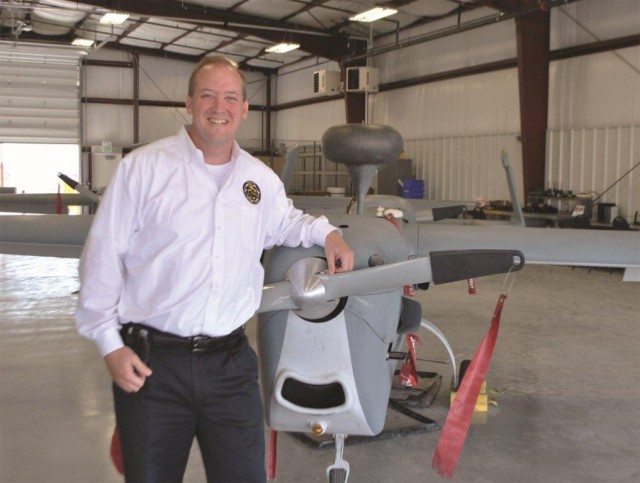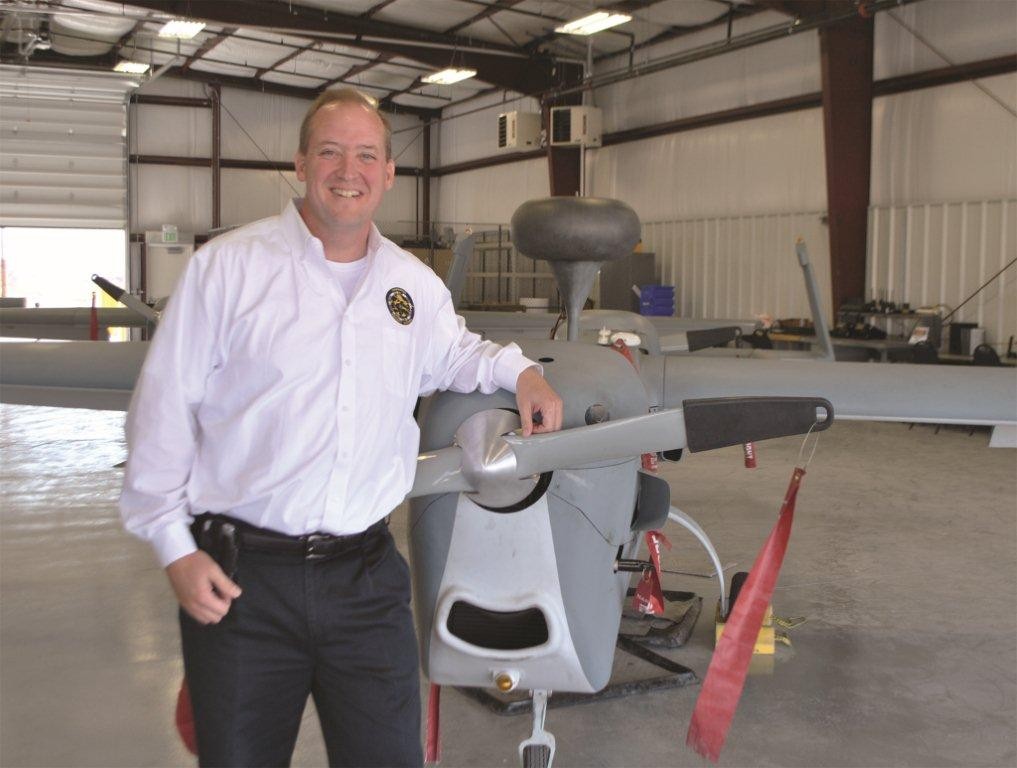REDSTONE ARSENAL, Ala. -- Unmanned Aircraft Systems deputy project manager Tim Owings has joined an elite group.
He received the Department of Defense Distinguished Civilian Service Award, the highest award given to a DoD civilian, during a Pentagon ceremony Nov. 4.
The award is presented to a small number of civilian employees whose careers reflect exceptional devotion to duty and significant contributions of broad scope in policy, scientific, technical or administrative fields of endeavor that have led to increased effectiveness in the operation of the Department of Defense.
Owings is among seven recipients this year and he is the only Army civilian represented in the group.
On receiving the award, Owings credited his Army team members serving with him in the Program Executive Office for Aviation, Unmanned Aircraft Systems Project Office.
"I was certainly stunned to find out I was even nominated. To actually get the award is a career culmination point in that it recognizes what our office has done on behalf of the Army," Owings said.
It had been a long road since the beginning of his 22-year career in the Army when Owings started as an engineer designing missile systems. A graduate of Auburn University, he had no plans in finding a job with the Army until he met his first mentor who instilled in him a passion for the Army, for designing missile systems, and for leading people.
David Washington, a product director in the missile program at the time and who eventually became Owings' first boss, talked him into giving the Army a try.
"I accepted a job for a lot less money than from private industry, but I felt in the long run that I would grow faster and do more with the right tutelage inside the Army," Owings said. "That's never been a mistake because right from the beginning, he (Washington) was exactly who I thought he was. He really is the reason why I started working for the Army."
Since that time, it has only gotten better and better, Owings said. "As you find your way inside the Army, the nice thing about it is that there are just so many places that are just starved for people who want to put their time and their brainpower to it," he said. "The Army to be this large and monolithic organization in so many ways, it really is a large social service and so there are ways to get yourself involved and really make a difference and that really resonated with me and still does today."
Raised by a single parent along with his brother, Owings' single biggest influence in his life has been his mother who taught him the importance of getting an education. "She never went to college but was always after me and my brother to do better, to stay in school and to go to college and to get those things done even though we didn't have any money, we figured out a way to get things done," he said. "She was the one who set the framework for my life."
The most important part of the job that Owings tries to do is to make sure that the younger work force knows that they can step out of their comfort zones and strive to do better than what they think they can do or become. "We want you to take risk, to do those things that you're passionate about because ultimately, it's what makes us better here in UAS and the Army as well."
In his role with UAS Project Office, Owings has been instrumental in helping the Army develop and deploy new UAS technologies. Along these lines, the award citation states that Owings "demonstrated visionary leadership and unwavering determination in leading and managing the rapidly growing capability that provides commanders with immediate and responsive support in theater. Unmanned aircraft systems are a proven force multiplier that reduced injuries and casualties within high-threat environments."
Also, Owings was a key player in the integration of new technologies and a leader within the Department of Defense for interoperability of UAS systems.
"One of the biggest things we have been able to do inside the Army is push interoperability standards and push proliferation of Unmanned Aircraft Systems. More importantly, we've been able to make sure information gets to the guy that it really matters to - that Soldier on the battlefield that's often living in extreme conditions. Anything we can do to make his or her life a little bit better has been a big accomplishment," he said.
Taking risks is a lesson learned time and again in making programs in the Army a success, according to Owings. A primary example was when he took over the Shadow program and became a product director. He didn't always see eye-to-eye with the management team and admitted he had always been a bit of a maverick. He thought it was time to leave the Army.
"On the way out, I was giving a briefing in terms of source selection of the Shadow program. The dynamic at the time was that the Army had failed two or three times in the UAV program. We were basically told that if we don't get it right this time, we're done. Col. Mike Hamilton, project manager at the time, heard that briefing and told me, 'we would like you to lead the Shadow program.'"
Although Owings had people in higher grades than he now reporting to him, Owings decided to keep his mind focused on the goal. "It was a very awkward time but at the same time I felt that my entire career had been asking for something like this and so I wasn't going to be intimidated by it and he (Hamilton) had confidence in me. "
The team set out with not much money and had many personnel issues to work through. "We failed our first IOT&E pretty miserably and crashed I think six airplanes in a week. I remember sitting there thinking, oh my God, maybe I should've left."
But at the end of the day, he and his team regrouped and applied the harsh lessons learned from failures and concentrated on solutions. "I spent the next year with my team revamping what we did on that airplane, came back a year later for an IOT&E, passed it, and that's been one of the biggest success stories in the Army."
As the deputy project manager for UAS, Owings looks for people who are passionate about work, who bring a high energy level to what they do, and who have a positive view that they can make things better.
Mentoring and leadership have always been the drivers for motivating people in an organization, Owings said. "In some degrees I consider myself a bit more of a coach today," he said. "Leadership in terms of making decisions is easy. Leadership in terms of developing people is difficult."
Decision-making had always come relatively easy to Owings but the development of people is one important thing on which he strives to work hardest. "I think it is so critical to any leader that you develop people that are not just below you but can replace you," he said. "Mostly, what I want people to understand is that even in places like the government, you can and should take risk.
"If you're not pushing your organization at the edge of what it is capable of doing and if you're not pushing yourself to the edge of what you can do, then you're not really doing everything that you can do for that organization or yourself because as an individual, I think we should all be looking for the next position that is two or three rungs better than what we think we are today because you're going to grow into that and over time there'll be another leapfrog and you'll move progressively into different positions. That's what we're looking for in the Army in terms of next generation leadership."
Mentoring has also been a two-way street for Owings, having learned much from the people with and for whom he has worked.
"Not until you've sat in these deputy roles, you don't completely realize it," he said referring to the dynamics in an organization. "My current boss, Col. (Gregory) Gonzalez -- we talk several times a day, and we bring different insights to different problems. There's a bit of beauty to the way we do that in the fact that the military being here three years and then changing out -- what that does is it refreshes the idea set and energy level of the organization.
"What I bring is the depth of knowledge into the operations, the business set. It's really a team effort more than anything. You really develop a relationship with your PM. You really complement each other's strengths and weaknesses, and with Col. Gonzalez, it has worked out fantastically well."
The result of such a dynamic is how far UAS has come over the last decade. In March 2003, there were only three systems (13 aircraft) deployed in support of then Operation Iraqi Freedom. Today, there are 337 systems (1,013 aircraft) in both theaters of the Overseas Contingency Operations. UAS passed its 1 million flight hour mark in May and in November, passed the 1 million combat flight hour mark. The Army employs UAS across all echelons from platoon level through division/corps, providing dedicated and organic support for tactical commanders and intelligence operations.
"I like that we work on a product that is relevant every single day, that Soldiers come home alive, that we avoid catastrophic personal events," Owings said. "You do feel as though it's a bit of higher calling and you're working on something that is just so relevant in today's fight."
From an office perspective, Owings credits all of UAS's success to the people, his team. "We are bit of a crazy, fanatic office in terms of the work. Most people who matched up with those things that I talked about earlier - the energy and passion that they bring - because we are never short of the energy, and I love the fact that we attract these young people because they believe in these products. And that to me is the culture that we've built here, and that is a culture of working hard, getting more done than what most people could have ever imagined."
UAS is never boring, and it is always intense, said Owings. Even with all the setbacks he has experienced, working through what is sometimes the bureaucracy within the government, he never takes his eyes off the goal of doing everything possible to bring Soldiers what they need in battle and help save lives.
"This organization is built on rapid response," he said. "If I could do one thing better, it would be to communicate to the young people here and impart that passion and impart that risk-taking mentality that has made us so successful.
"There's a saying that if you find the right job then you'll never work a day in your life. If I could live, I would do this job for free mainly because it does matter so much. That passion - I hope resonates in not just what we do but also with the people. This can be a tough business, it can be frustrating, it can be easy to lose your cool and your edge. Believe in what you're doing, believe that what you do makes a difference. "
Owings said he is proudest of his team and their accomplishments and compares his recognition to that of a quarterback in a football team. "I get more recognition than I deserve and it is all because of the work done by this great organization.
"I'm certainly proud of those accomplishments. It's a tremendous honor, a great honor to be recognized because of my team."


Social Sharing